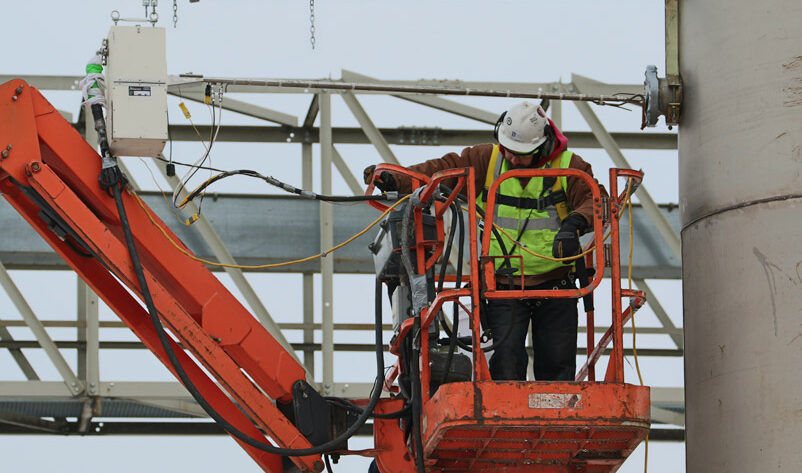Industrial Boiler Flue Gas Testing
The industrial boiler flue gas testing service is pivotal in ensuring optimal performance and compliance with environmental regulations. This test evaluates the emissions from boilers used in various industries, including oil and gas production facilities. By performing this analysis, we can identify potential inefficiencies in heat transfer, fuel consumption, and overall operational costs.
Understanding the composition of flue gases is essential for optimizing boiler efficiency. The primary components tested include carbon dioxide (CO₂), nitrogen oxides (NOₓ), sulfur dioxide (SO₂), and trace elements like mercury or arsenic. These tests help in assessing whether a boiler meets the stringent environmental standards set by regulatory bodies such as ISO, ASTM, and EN.
The testing process involves collecting a representative sample of flue gas from the boiler stack. This sample is then analyzed using advanced analytical instruments capable of detecting even minute concentrations of pollutants. The data collected informs operators on how to adjust combustion parameters for better performance and lower emissions.
For instance, optimizing the ratio of fuel-to-air mixture can significantly reduce NOₓ levels—a key objective in reducing acid rain formation. Similarly, monitoring CO₂ emissions provides insights into the carbon footprint associated with the operation, which is crucial for sustainability initiatives.
The importance of this testing cannot be overstated, especially given the increasing pressure on industries to adopt more sustainable practices. By adhering to these tests regularly, companies can ensure they are not only compliant but also contributing positively to environmental conservation efforts.
| Parameter | Unit | Range of Interest |
|---|---|---|
| Carbon Dioxide (CO₂) | % by volume | <10% for optimal performance |
| Nitrogen Oxides (NOₓ) | ppm | <5 ppm to meet strict environmental standards |
| Sulfur Dioxide (SO₂) | ppm | <10 ppm for compliance with regulations |
| Metallic Elements (e.g., Mercury, Arsenic) | µg/m³ | <0.5 µg/m³ to ensure safety and health standards |
In summary, industrial boiler flue gas testing is a cornerstone of efficient and environmentally responsible operations within the oil & gas sector. It enables precise tuning of combustion processes to enhance performance while minimizing adverse environmental impacts.
Industry Applications
- Power Generation Facilities: Ensuring optimal fuel efficiency and compliance with emissions standards.
- Oil Refineries: Monitoring the combustion of heavy fuels to minimize NOₓ production.
- Gas Processing Plants: Detecting leaks in gas transmission pipelines by analyzing flue gases from burners.
The data obtained from these tests is crucial for maintaining high standards of operational excellence and regulatory compliance across diverse industrial sectors. It also helps in identifying areas where technological advancements or process improvements could be implemented to further enhance sustainability efforts.
Why Choose This Test
- Precise measurement of key emission parameters like CO₂, NOₓ, and SO₂.
- Supports compliance with international standards such as ISO 14001, ASTM D7893, EN 14040.
- Provides actionable insights for improving boiler efficiency and reducing operational costs.
- Promotes sustainable practices by minimizing environmental impacts.
The accuracy and reliability of our testing services are backed by state-of-the-art equipment and experienced professionals. Our commitment to excellence ensures that every test delivers meaningful results, contributing to the continuous improvement of industrial operations worldwide.
Environmental and Sustainability Contributions
Industrial boiler flue gas testing plays a critical role in fostering a sustainable future by helping industries comply with stringent environmental regulations. By reducing emissions of greenhouse gases and pollutants, these tests contribute significantly to mitigating climate change impacts. The data collected from these tests also supports the development of strategies aimed at minimizing the carbon footprint of industrial activities.
In addition to regulatory compliance, the insights gained from this testing can lead to significant cost savings through enhanced operational efficiency. By optimizing fuel consumption and reducing waste, industries are better positioned to achieve long-term sustainability goals. Moreover, the information derived from these tests facilitates the implementation of cleaner technologies and practices, further enhancing environmental stewardship.
Our laboratory adheres to rigorous quality control measures, ensuring that all test results are accurate and reliable. This commitment to precision and integrity is reflected in our consistent performance across various industries. Whether it's a power plant or an oil refinery, we provide the necessary data to support informed decision-making processes that prioritize both economic viability and environmental responsibility.





